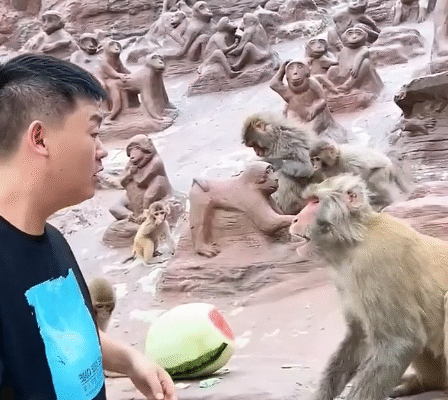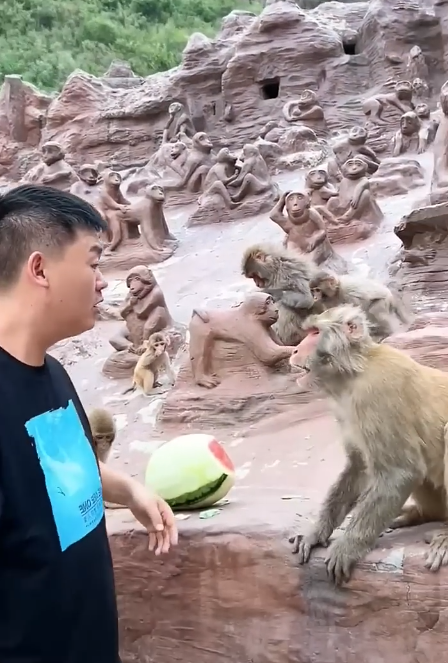
In the lush, misty mountains of the Eastern Realm, where the sun’s first rays kissed the ancient trees and the rivers sang in silver tones, there lived three extraordinary monkeys. They were no ordinary primates; they were known far and wide as the Monkey Kings. Each possessed a unique power, a temper as fiery as the sun, and a mind as cunning as the wind. Yet, what made them truly unforgettable was not only their prowess but the day their tempers broke, and they transcended into the spirit world — a tale that would be whispered in villages for generations, cautioning mortals against reckless imitation.
The three Monkey Kings were named Huán, Liáng, and Kǒng, each with distinct characteristics. Huán, the eldest, was a strategist, his golden fur shimmering in the sunlight, with eyes that could see through deception and lies. Liáng, the middle, was the strongest and most daring, with muscles honed through countless battles and a roar that could shake the tallest mountain. Kǒng, the youngest, was mischievous and clever, always planning tricks but never causing harm — until that fateful day.
For decades, the three lived in harmony, guarding the sacred grove that connected the mortal world with the unseen spiritual realm. Travelers who ventured near the grove were met with signs of the monkeys’ presence — branches snapped in intricate patterns, sudden gusts of wind, and echoes of laughter that carried an eerie yet playful melody. Most revered the Monkey Kings, seeking their guidance and protection, while some, driven by greed, attempted to capture their secrets, only to be met with swift and unpredictable retribution.
The Spark of Wrath
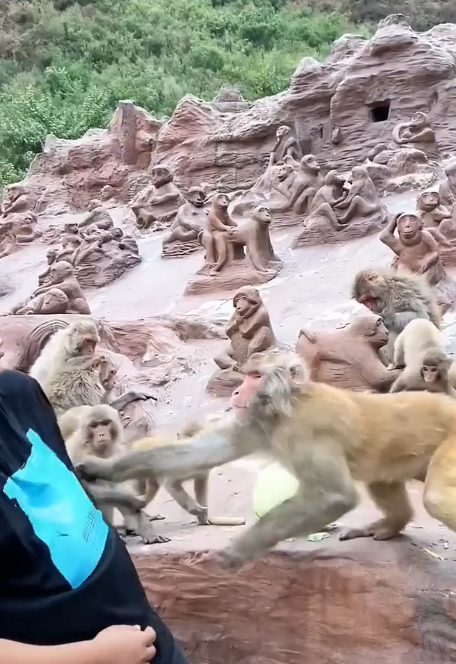
The story begins not with an invasion or a thief, but with a simple misunderstanding. In the heart of the sacred grove lay the Crystal Spring, a pool of water so pure that it reflected not only one’s image but also one’s innermost desires. The three Monkey Kings drank from this spring daily, each sip sharpening their senses and maintaining their connection to both the mortal and spiritual planes.
One morning, a small human village elder, seeking prosperity for his people, approached the spring. He brought offerings and prayed for blessings. While the elder’s intentions seemed pure, Kǒng, the youngest monkey, misinterpreted the prayers as a threat to their sacred waters. He called out to Huán and Liáng, warning them that humans were attempting to steal the essence of the spring.
Liáng, ever the brave and impulsive one, rushed forward without hesitation. Huán, sensing the potential for chaos, hesitated, but the flames of anger ignited when the elder, startled by the monkeys’ sudden attack, fell back, spilling his offerings. Kǒng laughed, thinking it was all a game, but the seriousness of the moment escalated.
In a rare display of unanimous wrath, the three Monkey Kings’ auras ignited. Their golden and silver fur shimmered, their eyes burned like twin suns, and their voices echoed across the valleys in a chorus of fury. They leapt, flew, and spun in perfect synchronization, creating a storm of power that rippled through the mountains.
Transcendence Into Spirit Form
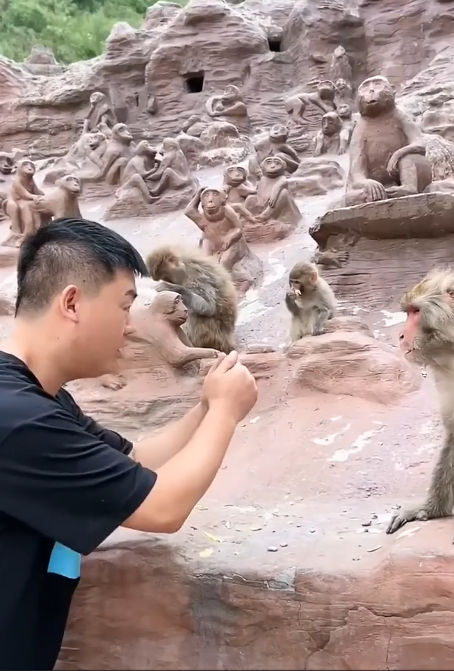
It was in that moment, amidst the chaos and rising energy, that something unexpected occurred. The sacred energies of the Crystal Spring, intertwined with the Monkey Kings’ immense power and unchecked anger, triggered a transformation.
Huán, Liáng, and Kǒng began to glow, their physical forms blurring into streaks of light and shadow. Their bodies elongated, muscles dissipated into energy, and their roars turned into harmonic vibrations that resonated beyond the mortal world.
When the light finally dimmed, the three Monkey Kings were no longer corporeal beings. They had become spirits — ethereal and boundless, roaming freely between realms. Their eyes, once sharp and calculating, now glowed with the wisdom of infinity. Their voices, though silent to mortals, whispered through the wind, carrying lessons and warnings to all who would listen.
It is said that their spirits could be felt during storms, glimpsed in the reflection of the Crystal Spring, and heard in the rustling of bamboo forests. They were both majestic and terrifying, playful yet admonishing. To see them was to experience awe, and perhaps a touch of fear.
The Lessons of the Three Spirits
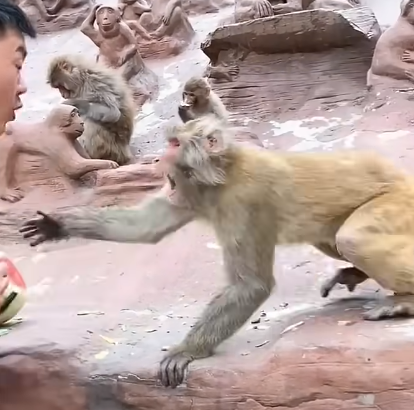
The transformation of the Monkey Kings was not only a tale of power but also a cautionary narrative for humans. Their spirits, though revered, became unpredictable. The elders of nearby villages warned their people: “Do not imitate their actions. Do not let anger guide your power. The Monkey Kings’ wrath transformed them into spirits, but human lives are fragile. Recklessness will not grant transcendence — only ruin.”
Each spirit carried a different aspect of their former selves:
- Huán, the Strategist Spirit: He embodied foresight and wisdom, appearing as a shimmering golden outline. When the wind blew in a peculiar way or shadows danced unnaturally, it was said Huán was observing, reminding mortals that patience and understanding must guide action.
- Liáng, the Warrior Spirit: His presence could shake the mountains themselves. Lightning storms, sudden tremors, or roaring winds were signs of Liáng’s restless energy, reminding humans of the consequences of impulsive actions and uncontrolled strength.
- Kǒng, the Trickster Spirit: Still playful and mischievous, Kǒng’s spirit delighted in subtle pranks, such as misplaced items or echoing laughter at dusk. His antics were meant to teach humility, showing that cleverness without responsibility could have unexpected repercussions.
These lessons carried across generations. The villagers, while fearing the Monkey Spirits, also revered them, leaving small offerings at the Crystal Spring and telling stories to their children. Respect the sacred. Respect your emotions. Respect your actions. That was the essence of the tale.
The Danger of Imitation
One of the most important warnings in this story is do not imitate the Monkey Kings recklessly. Their powers, though awe-inspiring, are not meant for human hands. The energy that fueled their transformation was tied to both the sacred grove and their primal nature.
Humans who attempted to mimic their aggression or cunning without spiritual preparedness found only chaos. Legends tell of villagers who tried to replicate the monkeys’ feats of strength or cleverness, only to face injury, loss, or misfortune. These cautionary tales remind mortals that raw power without wisdom, control, or respect for natural laws brings nothing but harm.
The Spirits’ Role Today
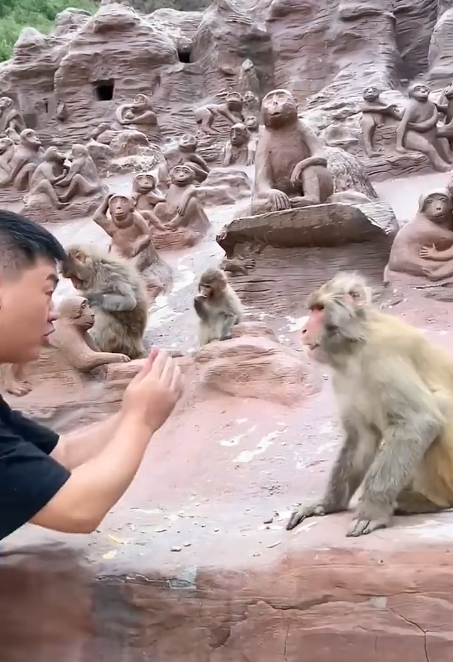
Even in modern times, the three Monkey Spirits remain a symbol of balance, respect, and the delicate dance between power and restraint. Travelers, adventurers, and seekers of wisdom journey to the sacred grove, hoping to catch a glimpse of the spirits or feel their energy.
Those who approach with humility often report experiences of insight, creativity, or clarity. Those who approach with arrogance or selfish intent may encounter obstacles — sudden storms, slippery paths, or uncanny misdirection.
The Monkey Spirits, it seems, continue to teach, guide, and remind humans: anger, cleverness, and strength must be balanced with wisdom, restraint, and respect.
Why This Story Matters
“The Three Monkey Kings Have Lost Their Temper and Become Spirits” is more than a fantastical tale; it is a mirror of the human condition. It shows us that:
- Unchecked emotion can transform our lives in unexpected ways. Just as the Monkey Kings’ wrath propelled them into the spirit realm, our own uncontrolled anger or impulsiveness can create long-lasting consequences.
- Power must be paired with responsibility. Strength, intelligence, or cunning without wisdom leads to imbalance.
- Respect for the natural and spiritual order is essential. The Crystal Spring symbolizes sacred forces that humans cannot dominate without consequence.
- Humility and caution are virtues. The Monkey Spirits serve as eternal reminders that life rewards patience, mindfulness, and thoughtful action.
Through these lessons, the tale transcends time, continuing to inspire storytellers, teachers, and seekers of wisdom.
Conclusion
The story of Huán, Liáng, and Kǒng — the three Monkey Kings who lost their temper and became spirits — is a tale of transformation, power, and timeless caution. Their journey from mortal guardians to ethereal entities serves as both awe-inspiring legend and moral instruction.
To humans, it is a warning: Do not imitate these daring feats without respect, awareness, or preparation. Their wrath was their strength, but it is not a path for mortals to tread lightly. Instead, one can admire from afar, learn humility, and practice mindfulness, patience, and controlled strength in everyday life.
So, when the wind rustles the leaves unusually, when the night sky flashes with a mysterious light, or when laughter echoes strangely in the bamboo forest, remember the three Monkey Spirits. They watch, they teach, and they remind all who hear their story: power is a gift, restraint is a wisdom, and anger — if untempered — can change everything.
And above all, never try to imitate them blindly, for their journey is theirs alone.
